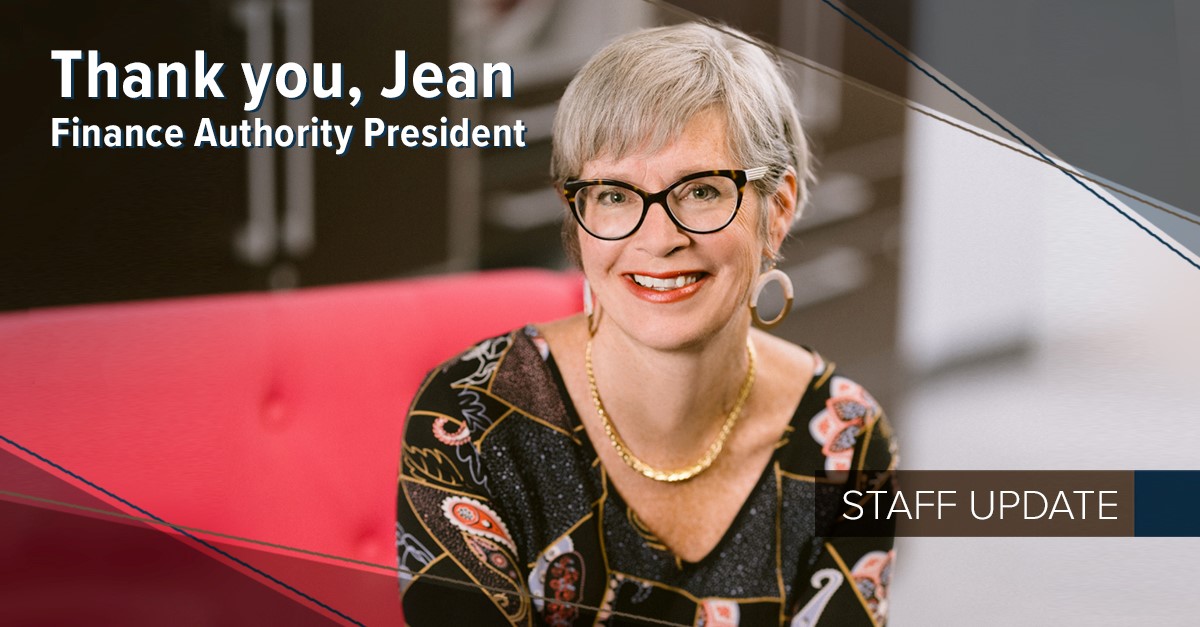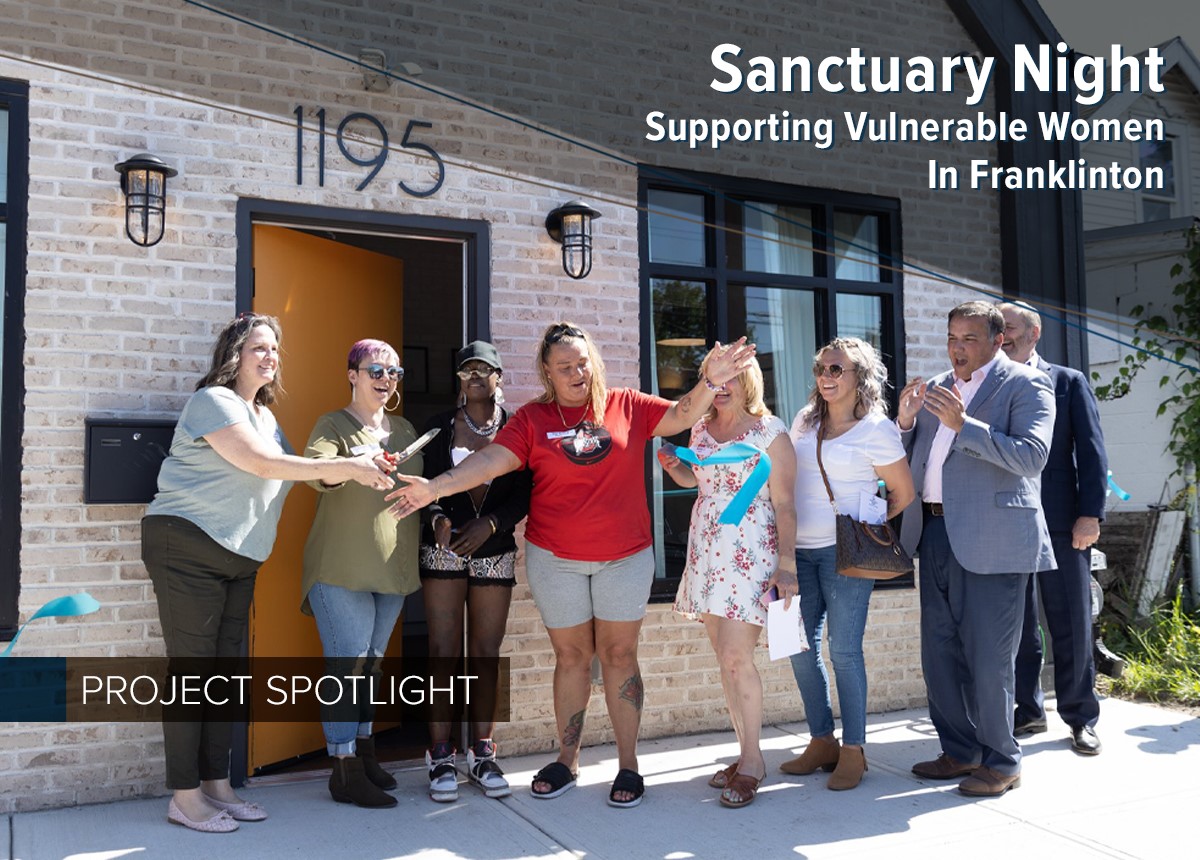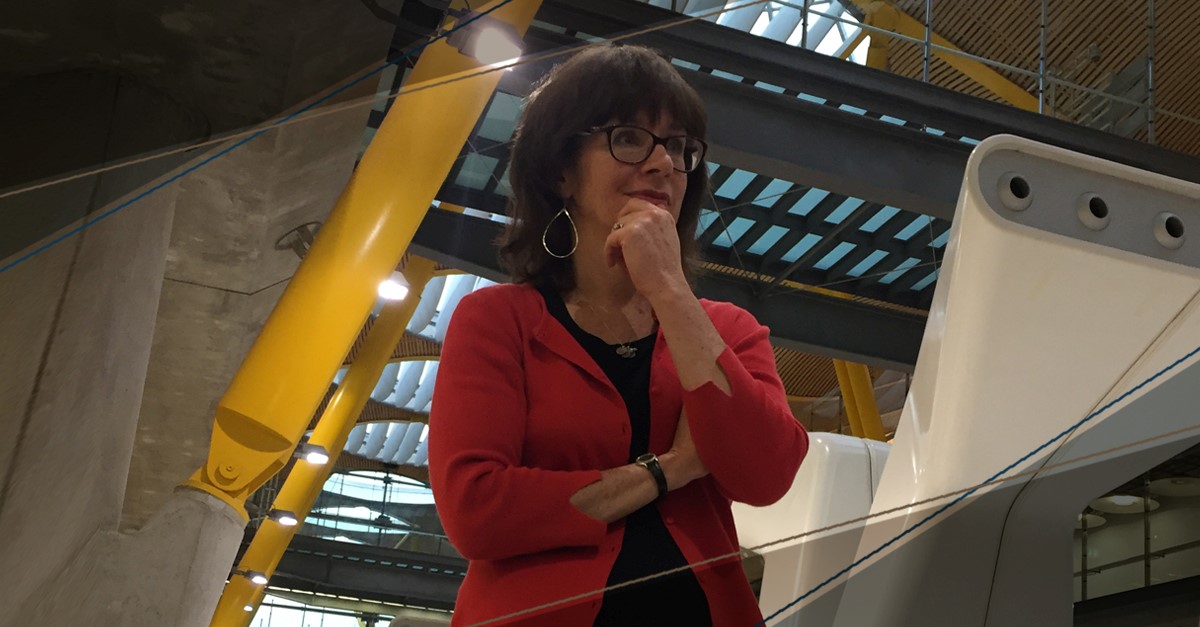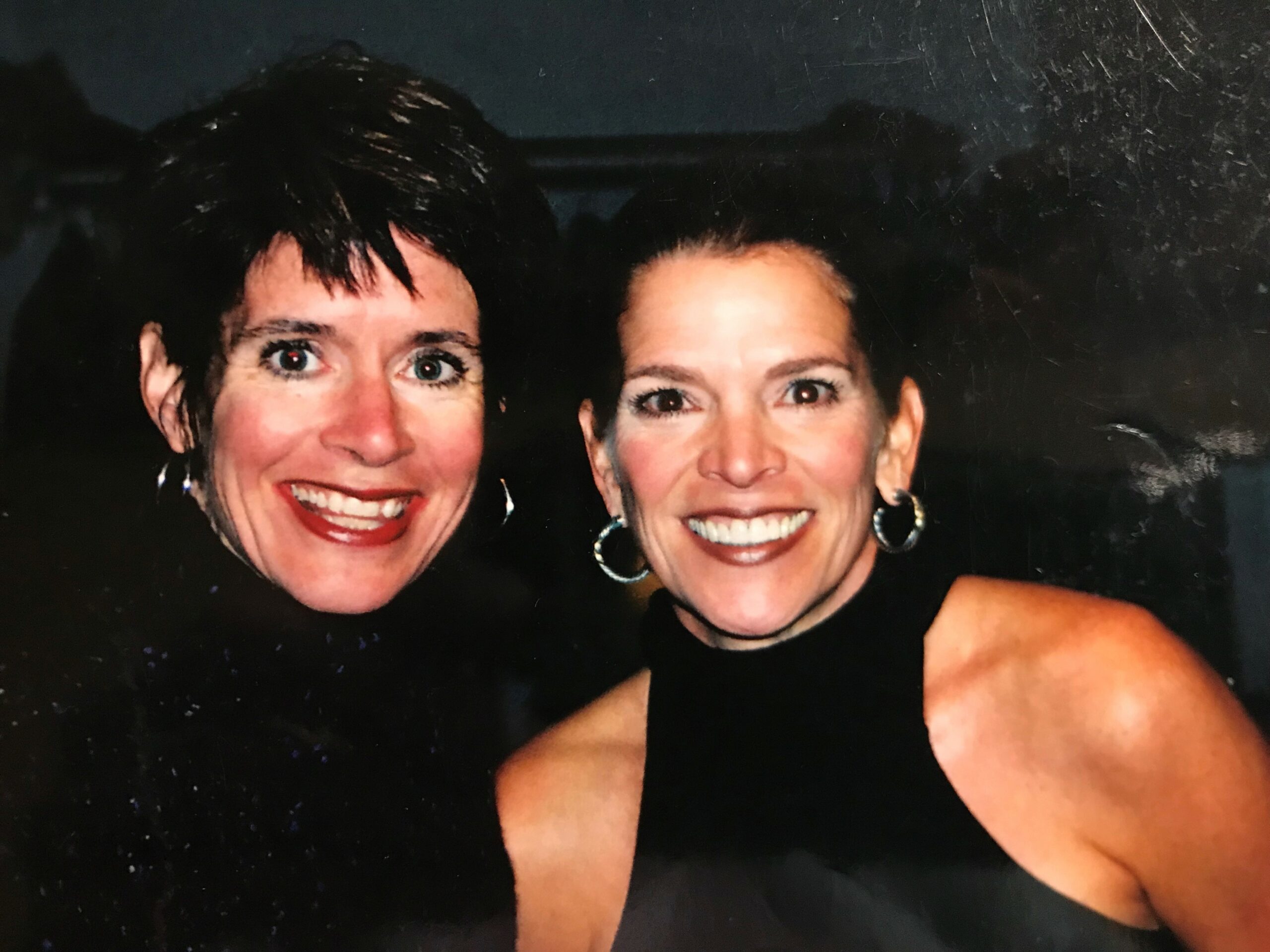 Since its creation in 2006, Columbus-Franklin County Finance Authority has benefitted from the steady leadership of one person: President Jean Carter Ryan. Under her guidance, the Finance Authority has become a trusted and respected community partner and a vital contributor to the financing stacks of countless projects, large and small. This month Jean will retire from her role, capping a career devoted to serving the public interest from the very beginning.
Since its creation in 2006, Columbus-Franklin County Finance Authority has benefitted from the steady leadership of one person: President Jean Carter Ryan. Under her guidance, the Finance Authority has become a trusted and respected community partner and a vital contributor to the financing stacks of countless projects, large and small. This month Jean will retire from her role, capping a career devoted to serving the public interest from the very beginning.
Selecting a leader for the new organization was a unique challenge, said former Finance Authority Board Chair Richard Barnhart. “We had to find a person to implement the Board’s vision,” he recalled. “Jean stood out as someone with the passion, commitment, and talent to build an economic financing powerhouse.” That’s exactly what she helped establish; under Jean’s guidance, the organization financed more than $3.8 billion via the Central Ohio Regional Bond Fund and other programs, including clean energy improvement financing, an innovative small business loan program, and other port authority services.
“I’ve especially appreciated Jean’s ability to adjust to the needs and preferences of such a diverse set of key actors, including board members, developers, political appointees, and elected officials,” said Board Member Joe Alutto, former EVP and Provost of The Ohio State University. “That’s about as diverse a group as one can imagine. Yet she accomplished this with rare style, grace, openness, and effectiveness.”
Building the organization wasn’t easy; just one year into her role, the 2008 financial crisis occurred. “The recession presented the Authority with many challenges that required creative thinking, tenacity, and an overpowering will to succeed,” said Barnhart. “I shudder to think whether the Authority would have survived, let alone thrived, under anyone else’s leadership.”
Virtually to a person, those who’ve worked with Jean valued her unique ability to balance empathy and critical thinking. “Jean asks tough questions – never just one or two, but as many questions as it takes to ensure any idea or proposal is well-thought-out and fully developed,” said Keith Conroy, a former Ohio Department of Development colleague. “She has the amazing ability to challenge those around her to achieve the best results, improving both the individual and the task at hand.”
Ask Jean which of her many projects stand out, and her answer reflects the diverse impact CFFA had in the region. She’s proud to have contributed to Dublin Bridge Park, because of both its scale and success. But Sanctuary Night in Franklinton is another favorite. Thanks to a modest, but essential, small business loan to the nonprofit, Sanctuary Night was able to improve its facility and expand its services to vulnerable women. “Politics never really mattered to Jean,” added Conroy. “She always focused on good, solid projects that were truly impactful.”

One person who knows Jean better than anyone is Finance Authority Operations Director Marcy Altomare, who has worked with her for 34 years – first at the Ohio Department of Development, and then with CFFA. “Jean survived three governors and numerous directors at Development, which was unheard of in those days,” said Altomare. “In 2007 she convinced me to join her at the Finance Authority, and we’ve worked hard since day one to make it a success. I can’t believe how quickly it went by, but boy we sure did have fun. Her next chapter is so well deserved!”
We spoke with Jean recently about her early experiences, the people who helped her achieve success, and what she has planned in retirement. It’s no surprise that she defers her success to her team and her Board, and that she’ll continue to support communities in need. Her journey may surprise you. It will certainly inform and inspire our organization for years to come.
Your final days with the Finance Authority are winding down. How are you feeling?
Jean Carter Ryan: I feel really good about it. The bigger issue for me is, two months after I leave, will I still feel that good about it? But I assume I will. I’m excited about the next chapters and steps.
What do you have planned for the immediate future?
All three of my daughters are involved in education, working in Franklinton and the west side in high-poverty schools, so I really want to be available to them to offer any help they need in the classroom: one-on-one tutoring, grading papers. I might even help them raise some money. You hear about this and it’s true in their schools: my daughter gives out rewards to kids and it’s always coming out of her own pocket.
My husband and I are also going to do some traveling. We have a cottage up by Lake Erie so I’m hoping to spend some more time there, too.
You’re in your final days. Is this just another week for you, or are you wrapping things up?
It’s really just another week, frankly. (Vice President) Patty Huddle and I have been working hand in hand since she started, and I think the organization is in good stead. I’ve created an extensive transition Bible to ensure that whoever takes my place will have everything that they need.
Is there any chance you will consult on this side, whether it’s with the Finance Authority or some other financing body – or even the client side?
I absolutely will with the Finance Authority if needed. I’m staying in town, and I love the place, so there’s nothing I would not do to assist, whether it’s on the dime or off. Someone [outside the Finance Authority] already asked me about consulting and I really don’t think I have an interest in doing that. For the Finance Authority, I’ll do anything that they need.
Was a career in public service a career goal of yours?
I always wanted to be in the public sector. Public service, from the very beginning, was something near and dear to my heart. I wanted to make a difference. I felt like that was a way for me to do so.
Was that based on your experience in college something you experienced at home earlier in life?
I think it started in high school in Lakewood, Ohio. It was very diverse economically. We had people living in poverty, blue collar, middle class, upper middle – everything in one little suburb. I saw how different people lived and succeeded. I’ve always been interested in the public side of the equation: where public dollars go, how they can help people’s lives improve.
I always had to work through college, and I had some really tough jobs. I worked on the third shift in a nursing home, changing bed pans, people’s sheets, stuff like that. I worked in a deli and as a waitress. I’ve just always had my heart in doing something that makes a difference.
 Let’s look back at your early career. What did you study in college?
Let’s look back at your early career. What did you study in college?
As an undergraduate, I went to Smith College in Northampton, Mass, and I majored in American Studies, which was an interdisciplinary study of American culture. I had a very, very good experience at Smith. I just loved it there. I’m still in touch with a number of dear friends from my college days.
I was an intern for a congressman one summer, and that was fun and very interesting, seeing the political process up close. His name was Dennis Eckert, a congressman from the Cleveland area. I did that between my junior and senior years in college. Then I went to graduate school at Ohio State, earning my master’s in city and regional planning. That’s how I found my way into economic development. It started with an internship with the Ohio Department of Development. They hired me full time after I graduated, to work on economic development, and that’s where my career started and took off.
What was your experience with the Department of Development?
I started as a business development representative, where we interfaced with businesses looking to expand, add jobs, make capital investments, or come in new to the state. I served that role for five years and then I was promoted to manage the office of business development. I was there for about two years and I was promoted again to manage the division, which was about 60 people. We did business development, economic development, finance, small business training, all-business training, and tax credits. All of that was under my guidance and I did that for 10 years. I really loved that job. Then I went from that job to this job.
Who did you encounter that had a particular influence on your career or character?
There were a number of people over the years who I just loved working for and with, and who impacted me. One was Bruce Johnson, who was the director of the Ohio Department of Development, on the Governor’s cabinet, and eventually became the lieutenant governor. He and I had differences of opinion about politics, but he was someone you could actually talk to, have a conversation and disagree with – and be respectful. He was very smart and pushed us all to make an impact, and be a change agent through the department.
That was really fun, watching how he managed the department, his role in the governor’s cabinet, and how to impact people. Bruce was tough. You had to be prepared. You had to be on your toes and I really liked working with him. I thought he was great.
Another was the first chair of the board within the Finance Authority, Mike McMenamin. We were so small and it was very different running it. Mike really helped me a lot. He could have been thinking, “God, what did I do, hiring this woman who doesn’t know what she’s doing?” But he didn’t think that. He worked with me and helped me. Anytime I had a question, I felt like I could call him, we could talk about it, and I could get some good advice. In those early years, it was very, very helpful for me.
Of the countless projects you’ve supported through Finance Authority, are there any that were your favorites or most memorable?
One is Bridge Park. It was so big and complex and transformative for Dublin. And we’re still working on it. We’ve been working on it for about 10 years. It’s one of those projects where you mention “Bridge Park” and everybody in central Ohio knows what you’re talking about. It’s been a lot of fun and, frankly, a great experience learning about some of the new tools and techniques that you need to use to make a project like that happen.
Then there are the smaller projects. We made a loan to Community Development For All People for the work that they’re doing on Parsons Avenue that really has impacted that area without gentrifying that community, which I think is really critical here. That loan was a fun loan, I think, for all of us. More recently, I’m proud of the small loan that we made to Sanctuary Night [the nonprofit in Franklinton for vulnerable women]. I like the ones where it’s a smaller scale and impacts people who need our help.

What advice do you have for your successor?
We have built a really strong team both internally and externally. My advice would be to rely on them, ask them questions, and get their feedback. Look to our Board and trust them for guidance and advice. We have all these really incredibly sharp minds – use them for the benefit of the organization and yourself. I’d like to see the next person take the Finance Authority to the next level.
What does the future of the Finance Authority look like?
It could look like many different things, thanks to the flexibility of the statutes that govern what we do. It will be important to keep an ear to the ground and think creatively about how we meet needs and be impactful as the community moves forward and continues to grow. That’s done by staying closely connected with our elected officials, our fellow economic development people, and people that economic development folks don’t traditionally work with, like in housing and human services.
What is your advice for community stakeholders? What would you like to see continue to evolve in this space?
One of the things I think that we struggle with, on this financing side of the equation, is finding ways to collaborate and not compete. Together we’re stronger. I would love to see more collaboration among economic development financing organizations. Talking about things that you can do together and things that do and don’t make sense.
Is there a structure for that kind of collaboration?
Earlier this year we met with nonprofits that focus on low-income housing or some form of housing affordability, like the Affordable Housing Trust, Homeport, and the Central Ohio CIC. We all got together and asked, “What are you working on? Are there ways that we could be working together? How can we help each other?” Most of us know each other, but it’s so helpful simply having those kinds of discussions. So when something comes up and needs to be done, and it may not be in our wheelhouse but it might be for the Affordable Housing Trust, I can pick up the phone and call Lark Mallory. And vice versa.
You’ve seen, and been a part of, remarkable change in Columbus – possibly the most transformative 15 or 20 years the city has seen in the last century. Are you surprised by how fast it’s growing and how robust the economy is?
Living here, it doesn’t seem surprising. It’s not until you take a couple of steps back and you think, “We’re in Ohio. How’s the rest of the State doing? We’re in the Midwest. How’s the rest of the Midwest doing?” Then you see we are, frankly, growing significantly more dramatically than other similar communities. Being the state capital, having The Ohio State University here, you just can’t talk that up enough.
I also think the strategy that went in place in 2010, when Columbus 2020, now One Columbus, was created, has done a fabulous job of making us a mecca for business development. I don’t think that we can stress that enough. It’s amazing. That said, I’m concerned about how expensive housing is and the lack of affordability and the things that we decree are affordable.
 As you look back on your career, is there anyone you’d like to thank or recognize?
As you look back on your career, is there anyone you’d like to thank or recognize?
Oh yes: Marcy Altomare. Marcy and I have worked together for 30 years. She came on within the first year after I started at the Finance Authority, and she has had my back and has kept us looking efficient and professional for the entire time we’ve worked together. I really can’t speak highly enough of Marcy. I just love her and really have appreciated everything that she’s done for me personally as well as for our organization and, frankly, before that at the State. She really takes her job seriously. She works so hard and has this incredible attention to detail that helps me be responsive. If she disagrees with something, she’ll ask me about it, which I like. I really can’t speak highly enough about her.
